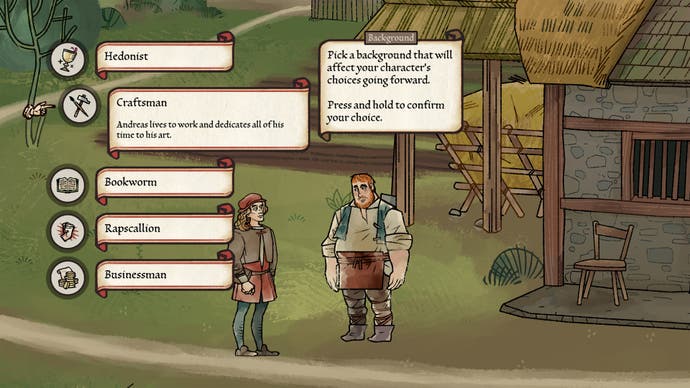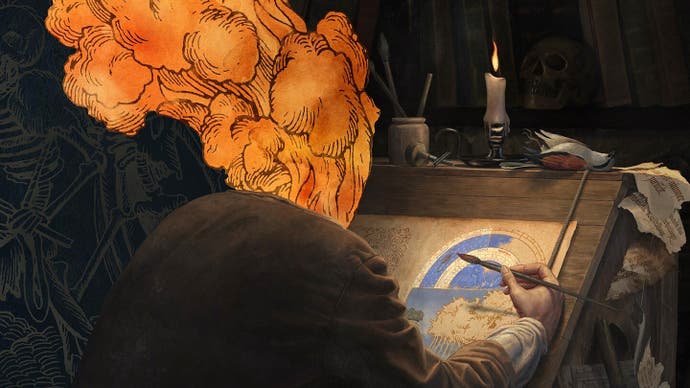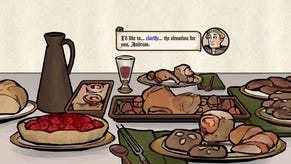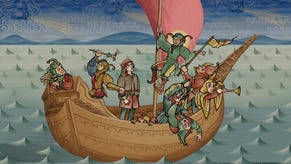Idle hours with Pentiment and A Month in the Country
Looking long and doing little.
I spent a few idle hours this week reading A Month in the Country, J.L. Carr's wonderful - and wonderfully short - novel of a Great War veteran who spends the summer of 1920 uncovering an artwork on the wall of a village church. I had never heard of Carr or the book before, which was just a perfect situation - I turned the first page and had absolutely no idea what was coming my way.
It's a lovely, restorative, slightly haunted book, and it left me thinking about rather a lot of things. One of them, weirdly, was a videogame, which seems on the surface to be an odd response to a bucolic novel about a forgotten way of life. But the videogame it left me thinking of was Pentiment, so maybe it isn't that odd.
Pentiment already comes with a book attached. It's impossible to play this late-medieval mystery of art and village life without thinking of The Name of the Rose, a novel it self-consciously cleaves to, and, at times, carefully subverts. Andreas in Pentiment, much like William in The Name of the Rose, is a privileged outsider snooping around a monastery where a murder has been committed. Both stories revolve around art and medieval politics and the intricate secrets of monastic life. Both are examinations of the way that meaning is constructed and wielded.
But Pentiment lingers on something that The Name of the Rose only dallies with - the passage of time. It's an important aspect to the novel - Adso is looking back on things that happened in his youth - but it's still left outside of the text for the most part. Pentiment, however, gives us a medieval murder mystery and then keeps on going, teasing out the many ways that events like this can continue to shape the years and decades that follow.
A Month in the Country is structurally like The Name of the Rose - it focuses on one summer, but a summer which we are reminded is being remembered after many years have passed. But it feels like Pentiment, a proper examination of the way that a bright memory of the past casts shadows on the rest of a life. Birkin, the protagonist, has come to the countryside to uncover his church artwork, but also to get some space from his memories of war, and from a relationship that has soured. But again and again we are encouraged to see the events that unfold - none of which are particularly dramatic - as being the crucial memories retained after a long life. We are told again and again, explicitly and implicitly, that everything that we're reading about mattered very much.
There's something lovely about the role art plays in both Pentiment and A Month in the Country. In Pentiment, several masterpieces are created, inspired by the dramatic events that unfold. In A Month in the Country, an old masterpiece is steadily uncovered, and we get to witness the growing bond between Birkin, the restorer, and the unnamed painter whose motives and personal history must be inferred or even guessed at. (In The Name of the Rose, incidentally, a description of a medieval artwork in the early chapters is famous for being the point at which a lot of casual readers give up on the whole thing.)

What lingers most about both the game and Carr's book, I think, is the moments without obvious drama. A lot of stuff happens in Pentiment, a lot of it involving life, death, secrets and betrayal. But when I look back now I remember and cherish the moments where, really, nothing much was happening - the gift that the game has for encouraging wandering, for making you learn your way around a place, stopping off to eat dinner with someone new or have an idle chat on a forest path.
Similarly, while A Month in the Country's most dramatic moments aren't particularly dramatic, I loved the moments that were even quieter - Birkin waking up in his belltower digs and frying some bacon, the instances where he has a snooze laid out on a tomb in the graveyard, the way he talks about the tentative process of art restoration: "It really amounted to looking long and doing little."
Looking long and doing little! Can games do this? If novels can, and can be gripping as they do it, I suspect games can as well. And I think, as Pentiment proves, they already are doing these things - in between all the other stuff they get up to.










